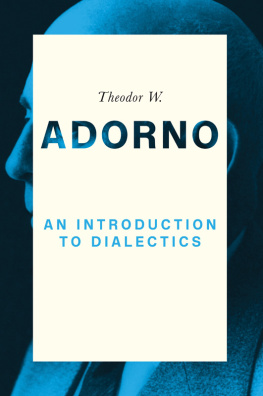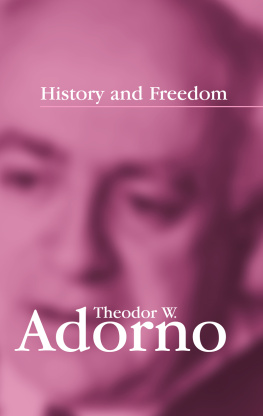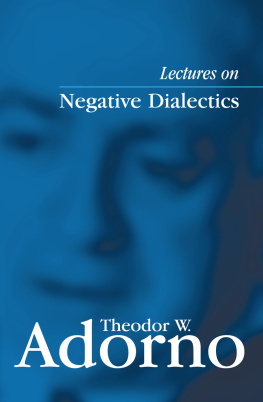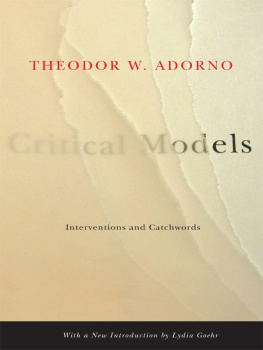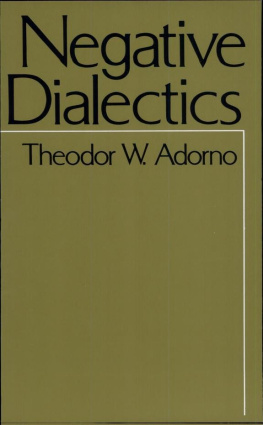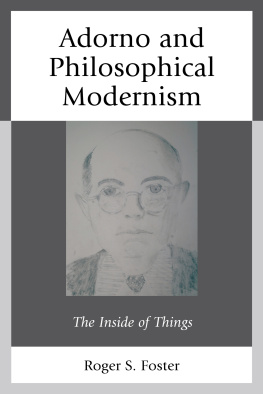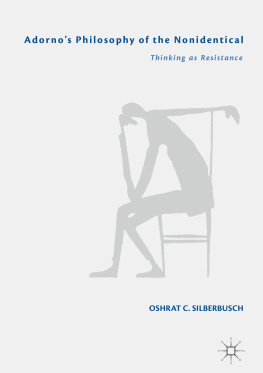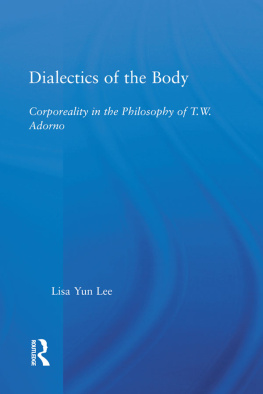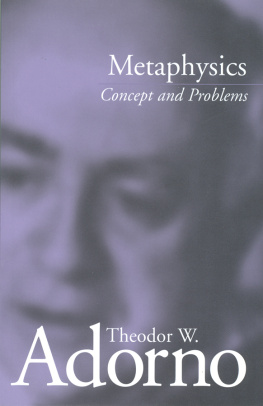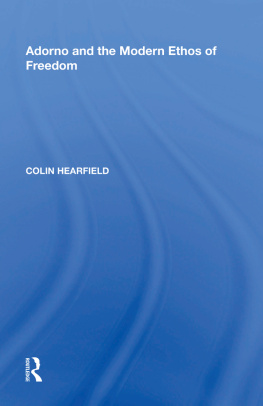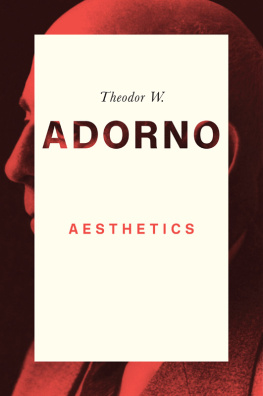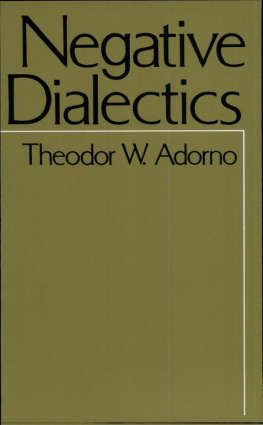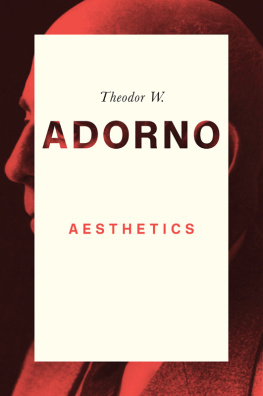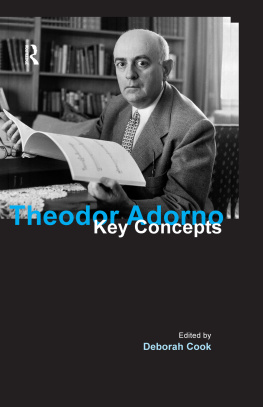
Copyright page
First published in German as Einfhrung in die Dialektik Suhrkamp Verlag, Berlin, 2010
This English edition Polity Press, 2017
Polity Press
65 Bridge Street
Cambridge CB2 1UR, UK
Polity Press
350 Main Street
Malden, MA 02148, USA
All rights reserved. Except for the quotation of short passages for the purpose of criticism and review, no part of this publication may be reproduced, stored in a retrieval system, or transmitted, in any form or by any means, electronic, mechanical, photocopying, recording or otherwise, without the prior permission of the publisher.
ISBN-13: 978-0-7456-9311-8
ISBN-13: 978-0-7456-7944-0 (pb)
A catalogue record for this book is available from the British Library.
Library of Congress Cataloging-in-Publication Data
Names: Adorno, Theodor W., 19031969. author.
Title: An introduction to dialectics / Theodor W. Adorno.
Other titles: Einfuhrung in die Dialektik. English
Description: Cambridge, UK ; Malden, MA : Polity Press, [2017] | Includes bibliographical references and index.
Identifiers: LCCN 2016020592 (print) | LCCN 2016036294 (ebook) | ISBN 9780745693118 (hardback) | ISBN 9780745679440 (pbk.) | ISBN 9780745693965 (Mobi) | ISBN 9780745694894 (Epub)
Subjects: LCSH: Dialectic.
Classification: LCC B105.D48 A3613 2017 (print) | LCC B105.D48 (ebook) | DDC 193dc23
LC record available at https://lccn.loc.gov/2016020592
Typeset in 10.5 on 12 pt Sabon
by Toppan Best-set Premedia Limited
Printed and bound in Great Britain by CPI Group (UK) Ltd, Croydon.
The publisher has used its best endeavours to ensure that the URLs for external websites referred to in this book are correct and active at the time of going to press. However, the publisher has no responsibility for the websites and can make no guarantee that a site will remain live or that the content is or will remain appropriate.
Every effort has been made to trace all copyright holders, but if any have been inadvertently overlooked the publisher will be pleased to include any necessary credits in any subsequent reprint or edition.
For further information on Polity, visit our website:
politybooks.com
Editor's Foreword
The series of lectures which Adorno delivered at the Johann Wolfgang Goethe University in Frankfurt in the summer semester of 1958 can still be said to provide what the original announcement in the official lecture lists promised: it offers an introduction to dialectics. Presented in a free and improvised style, Adorno's theoretical reflections here are generally more accessible than comparable discussions in his writings on Hegel or in Negative Dialectics. The lecture course can thus certainly be regarded as a kind of propaedeutic to these texts. In reading out specific passages from Hegel and interpreting them in some detail, Adorno clarifies central motifs of dialectical thought such as the movement of the concept or the meaning of determinate negation and dialectical contradiction. But he also makes it easier to approach this tradition of thought for those who already entertain sceptical or downright hostile attitudes towards it insofar as he systematically explores the difficulties it involves, addresses the resistance and the prejudices which it typically encounters, and discusses the specific challenges which dialectical thought presents. The only readers likely to be disappointed by Adorno's treatment of these questions are those who expect to be offered an instant recipe for such thinking. But, as Adorno insists, it belongs to the essence of dialectic that it is no recipe, but an attempt to let truth reveal itself (Lecture 3, p. 25).
In terms of Adorno's own development, these lectures document a moment of some significance, since this is the first time that the issue of dialectics is expressly addressed. A couple of years before the plan for a work on dialectics as such assumed definite shape in Adorno's mind, what we have here is a kind of methodological self-reflection on his previous substantive contributions, one where he explores for the first time that idea of an open or fractured dialectic (Lecture 10, p. 95) which he will finally go on to develop at length in Negative Dialectics. This is evident, above all, from Adorno's original general plan for the lectures (pp. 22153), which, in its almost symphonic layout, affords some insight into how his philosophy, in express relation to and with a constant eye upon the work of Hegel and Marx, attempts to situate and articulate itself. But the actual execution of the lectures, which differs significantly from the original plan in several respects, also explicates the central motifs of Adorno's own conception of dialectic: its definition as an attempt to do justice in thought itself to the non-identical, that is, precisely to those moments which are not exhausted in our thought (Lecture 9, p. 82); the emphasis upon its originally critical function; its specific opposition to ontology and positivism alike; its complementary relationship to the idea of a negative metaphysics; and, finally, the question, so important to Adorno, of that individual motivation for engaging with dialectics which today when the inner, namely dialectical, contradictions of capitalism are rousing us from a sort of post-modern somnolence actually seems to have lost none of its relevance: namely the experience of diremption or alienation (Lecture 8, p. 74) which makes us realize how dialectical thought itself responds to a negative condition of the world and, indeed, calls this negative condition by its proper name (Lecture 8, p. 72), but without thereby relinquishing the hope that what strives for reconciliation is something itself harboured within the diremption, the negative, the suffering of the world (Lecture 8, pp. 734).
Adorno delivered these one-hour lectures twice a week and presented them, as was usual with him, in a fairly free form that was based loosely on the notes and jottings he had set down beforehand. The lectures were recorded on tape as they were delivered not specifically for subsequent publication but primarily for Adorno's own use and were then transcribed. This transcription of the tape recordings forms the basis of the present edition and is preserved in the Theodor W. Adorno Archiv under Vo 30233249. On account of a one-week break after Easter, Adorno actually delivered twenty lectures rather than the twenty-two that were originally planned. No transcription has survived of the opening lecture, so that in this case the text is based on a stenograph by someone who can no longer be identified.
The presentation of the text follows the general editorial principles established for the posthumously published lectures of Adorno. This means that the primary intention here was not to produce a critical edition of the text but one that would be as immediately accessible as possible, especially since, with all the lectures, we are not dealing with texts which Adorno composed in written form or even authorized as such. In order to preserve the immediate oral character of the lectures the syntax of the original as recorded in the transcription was left unaltered as far as this was possible. The punctuation of the text here has been limited to clarifying the often rather involved sentences and periods and thus making the line of thought as clear as possible. This rule has not been observed in a small number of cases where intelligibility would otherwise be severely compromised. A number of tacit changes have also been introduced in the case of obvious verbal slips on Adorno's part or obvious mistakes in the transcription arising from typing errors or mishearing of the tape recording. All of the relevant substantive changes in relation to the transcription, which must be regarded as additions of the editor, have been identified by the use of square brackets in the text. All conjectural emendations where the editor felt obliged to deviate from the transcription and suggest a different reading have been specifically identified in the notes. The editor has deviated from the otherwise standard editorial practice with regard to Adorno's lectures only in two respects: firstly, the ancient Greek words and expressions which Adorno sometimes introduces into the lectures have been supplemented with a corresponding transliteration of the Greek script in square brackets; secondly, while the German quotations from Hegel in the lectures are cited from the modern Suhrkamp edition of Hegel's writings edited by Karl Marcus Michel and Eva Moldenhauer, the editor also decided in the notes to cite the numerous quotations from Hegel's works in accordance with the editions which Adorno himself obviously used to read from in the course of his lectures. This decision was motivated not by any desire to create a supposed aura in this regard but simply to clarify certain observations on Adorno's part which are intelligible only in relation to these older editions (with regard to the older orthography of
Next page
